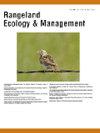Ranchers’ and Federal Land Managers’ Mental Models of Rangeland Management Across an Environmental Gradient
IF 2.4
3区 环境科学与生态学
Q2 ECOLOGY
引用次数: 0
Abstract
Managing rangelands to meet social-ecological goals requires monitoring ecological indicators to inform management responses. These goals and monitoring objectives are grounded in land managers’ understandings, or mental models, of the rangeland system. Rangeland managers’ mental models are often highly place-specific, which can enable management actions to be matched to local conditions. In the western United States, ranchers and federal agency personnel, like those in the Bureau of Land Management (BLM), are two of the primary social groups involved in rangeland management. We compared ranchers’ and BLM personnel's rangeland mental models across two regions. We conducted semi-structured interviews about their management goals and objectives, as well as their perspectives on important rangeland system dynamics and the constraints inhibiting them from reaching their goals. We used a mixed-methods approach, including network analysis metrics, to elucidate similarities and differences in their mental models and in the ecological indicators they use to assess rangeland health and to trigger management actions. We found that their goals differed more between social groups, whereas specific management objectives differed more between geographic regions and reflected local priorities, such as invasive species and wildfire risk. Ranchers’ and agency personnel's mental models indicated divergent perspectives on the seasonal impacts of livestock on soils and vegetation and about grazing as either a disturbance to be mitigated or as a tool to maintain critical ecosystem processes. These findings indicate that ranchers and agency personnel have place-specific knowledge, but that their mental models are more similar to others in their social group than to those outside their social group in the same region. Differences in their conceptions of rangeland management suggest areas for increased communication between ranchers and agency personnel, which could in turn promote mutual understanding and collaboration toward shared objectives, thereby helping both groups overcome constraints to reach their management goals.
跨环境梯度的牧场主和联邦土地管理者牧场管理的心理模型
管理牧场以实现社会生态目标需要监测生态指标,为管理对策提供信息。这些目标和监测目标建立在土地管理者对牧场系统的理解或心理模型的基础上。牧场管理者的思维模式通常是高度地域性的,这可以使管理行动与当地条件相匹配。在美国西部,牧场主和联邦机构人员,如土地管理局(BLM)的人员,是参与牧场管理的两个主要社会群体。我们比较了两个地区的牧场主和土地管理局人员的牧场心理模型。我们对他们的管理目标和目的进行了半结构化的访谈,以及他们对重要牧场系统动态的看法和阻碍他们实现目标的制约因素。我们使用了一种混合方法,包括网络分析指标,来阐明他们的心理模型和他们用来评估牧场健康和触发管理行动的生态指标的异同。我们发现他们的目标在不同的社会群体之间差异更大,而具体的管理目标在不同的地理区域之间差异更大,并反映了当地的优先事项,如入侵物种和野火风险。对于牲畜对土壤和植被的季节性影响,以及放牧是一种需要缓解的干扰,还是一种维持关键生态系统过程的工具,牧场主和机构人员的心理模型表明了不同的观点。这些发现表明,牧场主和机构人员具有特定地点的知识,但他们的心智模式与同一地区的社会群体中的其他人更相似,而不是与其社会群体外的人。他们对牧场管理的不同观念表明,牧场主和机构人员之间应该加强交流,这反过来可以促进相互了解和合作,实现共同的目标,从而帮助双方克服限制,实现其管理目标。
本文章由计算机程序翻译,如有差异,请以英文原文为准。
求助全文
约1分钟内获得全文
求助全文
来源期刊

Rangeland Ecology & Management
农林科学-环境科学
CiteScore
4.60
自引率
13.00%
发文量
87
审稿时长
12-24 weeks
期刊介绍:
Rangeland Ecology & Management publishes all topics-including ecology, management, socioeconomic and policy-pertaining to global rangelands. The journal''s mission is to inform academics, ecosystem managers and policy makers of science-based information to promote sound rangeland stewardship. Author submissions are published in five manuscript categories: original research papers, high-profile forum topics, concept syntheses, as well as research and technical notes.
Rangelands represent approximately 50% of the Earth''s land area and provision multiple ecosystem services for large human populations. This expansive and diverse land area functions as coupled human-ecological systems. Knowledge of both social and biophysical system components and their interactions represent the foundation for informed rangeland stewardship. Rangeland Ecology & Management uniquely integrates information from multiple system components to address current and pending challenges confronting global rangelands.
 求助内容:
求助内容: 应助结果提醒方式:
应助结果提醒方式:


